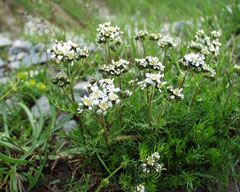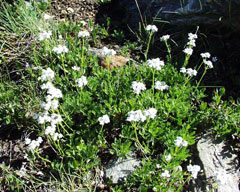 |
|
http://fr.wikipedia.org/wiki/Projet:Botanique/Accord_Henry_Brisse |
 |
| http://fr.wikipedia.org/wiki/Projet:Botanique/Accord_Henry_Brisse |
Translate this page:
Summary
Physical Characteristics

 Achillea erba-rotta moschata is a PERENNIAL growing to 0.2 m (0ft 8in).
Achillea erba-rotta moschata is a PERENNIAL growing to 0.2 m (0ft 8in).
See above for USDA hardiness. It is hardy to UK zone 6 and is not frost tender. It is in flower in June, and the seeds ripen in July. The species is hermaphrodite (has both male and female organs) and is pollinated by Insects.
Suitable for: light (sandy), medium (loamy) and heavy (clay) soils, prefers well-drained soil and can grow in nutritionally poor soil. Suitable pH: mildly acid, neutral and basic (mildly alkaline) soils. It cannot grow in the shade. It prefers dry or moist soil. The plant can tolerate maritime exposure.
UK Hardiness Map
US Hardiness Map
Synonyms
A. moschata.
Plant Habitats
Cultivated Beds;
Edible Uses
References More on Edible Uses
Medicinal Uses
Plants For A Future can not take any responsibility for any adverse effects from the use of plants. Always seek advice from a professional before using a plant medicinally.
Appetizer Diaphoretic Digestive Diuretic Stomachic Tonic
The leaves and flowering stems are appetizer, diaphoretic, digestive, diuretic, stomachic and tonic[9, 46, 61]. An infusion is used in the treatment of liver and kidney disorders, as a tonic to the digestive system, exhaustion, nervous headaches etc[9]. The plant is harvested in the summer and can be dried for later use[9].
References More on Medicinal Uses
The Bookshop: Edible Plant Books
Our Latest books on Perennial Plants For Food Forests and Permaculture Gardens in paperback or digital formats.

Edible Tropical Plants
Food Forest Plants for Hotter Conditions: 250+ Plants For Tropical Food Forests & Permaculture Gardens.
More

Edible Temperate Plants
Plants for Your Food Forest: 500 Plants for Temperate Food Forests & Permaculture Gardens.
More

More Books
PFAF have eight books available in paperback and digital formats. Browse the shop for more information.
Shop Now
Other Uses
References More on Other Uses
Cultivation details
Succeeds in most soils but prefers a well-drained soil in a sunny position[1]. Lives longer in a poor soil[200]. Hybridizes freely with other members of this genus[200]. Plants succeed in maritime gardens[233].
References Carbon Farming Information and Carbon Sequestration Information
Temperature Converter
Type a value in the Celsius field to convert the value to Fahrenheit:
Fahrenheit:
The PFAF Bookshop
Plants For A Future have a number of books available in paperback and digital form. Book titles include Edible Plants, Edible Perennials, Edible Trees,Edible Shrubs, Woodland Gardening, and Temperate Food Forest Plants. Our new book is Food Forest Plants For Hotter Conditions (Tropical and Sub-Tropical).
Shop Now
Plant Propagation
Seed - sow spring or early autumn in a cold frame[133]. The seed usually germinates in 1 - 3 months[133]. When large enough to handle, prick the seedlings out into individual pots and plant them out in the summer. Division in spring or autumn. Very easy, the divisions can be planted direct into their permanent positions. Basal cuttings of new shoots in spring. Very easy, collect the shoots when they are about 10cm tall, potting them up individually in pots and keeping them in a warm but lightly shaded position. They should root within 3 weeks and will be ready to plant out in the summer.
Other Names
If available other names are mentioned here
Native Range
Coming Soon
Weed Potential
Right plant wrong place. We are currently updating this section.
Please note that a plant may be invasive in one area but may not in your area so it's worth checking.
Conservation Status
IUCN Red List of Threatened Plants Status :

Growth: S = slow M = medium F = fast. Soil: L = light (sandy) M = medium H = heavy (clay). pH: A = acid N = neutral B = basic (alkaline). Shade: F = full shade S = semi-shade N = no shade. Moisture: D = dry M = Moist We = wet Wa = water.
Now available:
Food Forest Plants for Mediterranean Conditions
350+ Perennial Plants For Mediterranean and Drier Food Forests and Permaculture Gardens.
[Paperback and eBook]
This is the third in Plants For A Future's series of plant guides for food forests tailored to
specific climate zones. Following volumes on temperate and tropical ecosystems, this book focuses
on species suited to Mediterranean conditions—regions with hot, dry summers and cool, wet winters,
often facing the added challenge of climate change.
Read More
Expert comment
Author
(Wulfen.)I.Richardson.
Botanical References
50200
Links / References
For a list of references used on this page please go here
Readers comment
© 2010, Plants For A Future. Plants For A Future is a charitable company limited by guarantee, registered in England and Wales. Charity No. 1057719, Company No. 3204567.